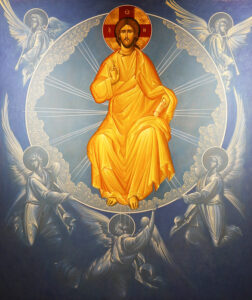
The Ascension
Yesterday we remembered Jesus’ ascension to the Father. This Sunday we will remember and celebrate his ascension together. Today, we remember the life of the great reformer, John Calvin. Desiring to know God and his revealed word to us, Calvin meditated and wrote extensively on almost every passage of Scripture. Below are short snippets from his commentaries on the six readings used for Ascension Day – Ps 47; Ps 110:1-5; Mk 16:9-20; Lk 224:44-53; Acts 1:1-11; Eph 1:15-23. His comment on the Ephesians passage might be the most helpful in light of our current grief over and for the “thousand distresses, to which we are daily liable.”
God has gone up with a shout, the Lord with the sound of a trumpet. – Psalm 47:5
Earthly kings may indeed be said to sit at God’s right hand, inasmuch as they reign by his authority; here, however, something more lofty is expressed, in that one king is chosen in a peculiar manner, and elevated to the rank of power and dignity next to God, of which dignity the twilight only appeared in David, while in Christ it shone forth in meridian splendour.
The Lord says to my Lord: “Sit at my right hand, until I make your enemies your footstool.” – Psalm 110:1
There is here an allusion to the ancient ceremony which was observed under the Law. As the sound of trumpets was wont to be used in solemnizing the holy assemblies, the prophet says that God goes up, when the trumpets encourage and stir up the people to magnify and extol his power. When this ceremony was performed in old time, it was just as if a king, making his entrance among his subjects, presented himself to them in magnificent attire and great splendour, by which he gained their admiration and reverence. At the same time, the sacred writer, under that shadowy ceremony, doubtless intended to lead us to consider another kind of going up more triumphant—that of Christ when he “ascended up far above all heavens,” (Eph. 4:10,) and obtained the empire of the whole world, and armed with his celestial power, subdued all pride and loftiness.[1]
So then the Lord Jesus, after he had spoken to them, was taken up into heaven and sat down at the right hand of God. – Mark 16:19
While he blessed them, he parted from them and was carried up into heaven. – Luke 24:51
Now as he did not, after his resurrection, appear indiscriminately to all, so he did not permit all to be the witnesses of his ascension to heaven; for he intended that this mystery of faith should be known by the preaching of the gospel rather than beheld by the eyes.[2]
“Men of Galilee, why do you stand looking into heaven? This Jesus, who was taken up from you into heaven, will come in the same way as you saw him go into heaven.” – Acts 1:11
I am not of their opinion who think that this name was given the apostles after an opprobrious sort, as if the angels meant to reprehend the slowness and dullness of the apostles. In my opinion, it was rather to make them more attentive, in that men, whom they did never see before, did name them as though they had perfectly known them. But they seem to reprehend without cause, for looking up into heaven. For where should they rather seek for Christ than in heaven? Doth not the Scriptures also oftentimes exhort us thereunto? I answer, that they were not reprehended because they looked up towards heaven; but because they coveted to see Christ, when as the cloud which was put between them and him did keep them from seeing him with their bodily senses: Secondly, because they hoped that he would return again straightway, that they might enjoy the sight of him again, when as he did ascend to stay in the heavens until such time as he should come to judge the world. [3]
…the immeasurable greatness of his power toward us who believe, according to the working of his great might that he worked in Christ when he raised him from the dead and seated him at his right hand in the heavenly places… – Eph 5:19-20
With the greatest propriety does he enjoin us to contemplate this power in Christ; for in us it is hitherto concealed. “My strength,” says he, “is made perfect in weakness.” (2 Cor. 12:9.) In what do we excel the children of the world but in this, that our condition appears to be somewhat worse than theirs? Though sin does not reign, it continues to dwell in us, and death is still strong. Our blessedness, which lies in hope, is not perceived by the world. The power of the Spirit is a thing unknown to flesh and blood. A thousand distresses, to which we are daily liable, render us more despised than other men.
Christ alone, therefore, is the mirror in which we can contemplate that which the weakness of the cross hinders from being clearly seen in ourselves. When our minds rise to a confident anticipation of righteousness, salvation, and glory, let us learn to turn them to Christ. We still lie under the power of death; but he, raised from the dead by heavenly power, has the dominion of life…. [W]e shall find our advantage in directing our views to Christ, that in him, as in a mirror, we may see the glorious treasures of Divine grace, and the unmeasurable greatness of that power, which has not yet been manifested in ourselves.[4]
Minister to Youth & Families

